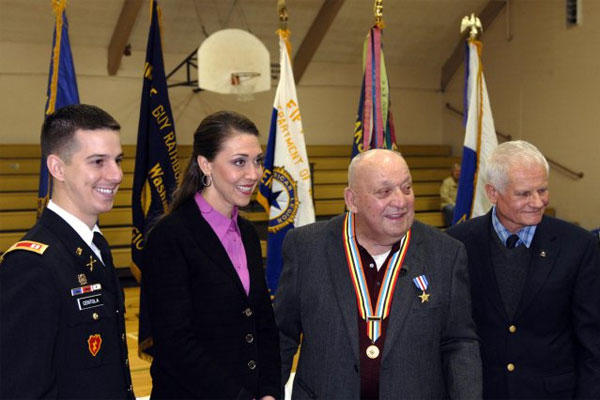JOINT BASE LEWIS-McCHORD, Wash. -- Several hundred community members, well-wishers, dignitaries and friends gathered to view the presentation of the Silver Star Medal to William V. Wuorinen for heroic actions during combat operations in the Korean War, at an award ceremony held at Naselle-Grays River Valley School, Naselle, Wash., Jan. 30.
An infantryman assigned to 1st Platoon, Company L, 3rd Battalion, 9th Infantry Regiment, 2nd Infantry Division, then Pfc. Wuorinen received the award for "gallantry in action" from Mar. 16, 1953, to Mar. 17, 1953, contributing to the overwhelming success of the command's mission to drive Chinese forces from Hill 355 in the vicinity of Un-Dong, North Korea.
"Courage is contagious and when a brave man takes a stand, the spines of others are stiffened," said U.S. Rep. Jaime Herrera Beutler, speaking the words of William Franklin "Billy" Graham, in her address to the audience as she described Wuorinen's act of bravery.
In the course of the battle, under intense attack by hostile forces, Wuorinen and another Soldier first dragged to cover and then provided life-saving treatment to a wounded senior officer, holding off an attacking force of Chinese soldiers until reinforcements and medical personnel arrived.
At one point, when capture seemed imminent, they placed all of their personal information except for their Geneva Convention cards in a pile and burned them, denying it to the enemy.
The lieutenant colonel and other Soldier each received a Silver Star as well as the Distinguished Service Cross but due to a paperwork mistake, Wuorinen's award was only recently approved by the Army Decorations Board.
"Our purpose here today is to correct the colonel's error," said Herrera Beutler. "To provide an award that Mr. Wuorinen should have received almost 60 years ago. He is a true American hero."
In addition to the Silver Star, the congresswoman presented Wuorinen with the National Defense Service Medal and the Korean War Service Medal. He also received the Republic of Korea's Ambassador for Peace medal from the Korean Veterans Association.
"I don't know how to make great speeches, but I do know how to say 'thank you' and mean it," said Wuorinen in his remarks.
A life-long member of the Naselle community, Wuorinen returned from the war, resumed work in the logging industry, married and raised a family. He admitted to being troubled over the years, having risked his life for a fellow Soldier and not receiving recognition for it.
"Today has changed all that," said Wuorinen, as he thanked all the individuals involved in the effort to get the award approved. "It means more to me than you can ever know."
"Never give up," Wuorinen said, "because it will come to you someday."
The 9th Infantry Regiment ("Manchu") is one of the oldest and most decorated active duty infantry units in the Army. On behalf of "Manchu" Soldiers, past, present, and future, Capt. Michael Centola, rear detachment commander of 4th Battalion, 9th Infantry Regiment., 4th Stryker Brigade Combat Team, 2nd Infantry Division, and Soldiers from the unit assisted in planning and conducting the ceremony.
"It was inspiring to see an entire small town take the time out of their day to honor Mr. Wuorinen," said Centola. "From speaking with those gathered for the event, it was obvious that he was well-loved by the community."
The Silver Star is currently awarded by all branches of the armed forces to any person who, while serving in any capacity, is cited for gallantry in action against an enemy of the United States while engaged in military operations involving conflict with an opposing force.
The Silver Star medal had its beginning during World War I. An Act of Congress of July 9, 1918, authorized the wearing by Army personnel of a small silver star, three-sixteenths of an inch in diameter, upon the service ribbon of a campaign medal, to indicate "a citation for gallantry in action, published in orders issued from headquarters of a general officer, not warranting the award of a Medal of Honor or Distinguished Service Cross."
Known in the Army as the "citation star," the award was made retroactive, so that all those cited for gallantry in action in previous campaigns, even as far back as the Spanish-American War, were eligible to wear it.






























